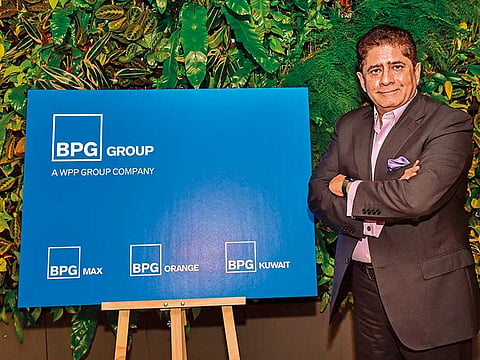Dubai-based ad agency wants its independence back
BPG cuts reliance on minority partner WPP and fully revamps organisation

Dubai: Avi Bhojani is out to reclaim independence for BPG, the 38-year old advertising and marketing services network.
Even if this means putting in some distance between BPG (Bates Pan Gulf) and WPP — the world’s largest advertising group that has held 40 per cent in BPG since 2003, when it inherited the stake upon acquiring Cordiant, the then holding company of Bates Worldwide.
“We want destiny back in our hands and that means pretty much taking back control,” said Bhojani. “Sure, will still continue to collaborate with WPP entities like GroupM Mena, but that needs to be done on more of a quid pro quo arrangement. It won’t work if no value is being added to the business, or if we do not contribute our bit.
“We now want the agility not to have conflicting shareholders. If our integrated marcom business has a client who wants us to collaborate with entities other than WPP-owned, it should not be prevented because of us being a company with a minority WPP stake. Now, since we are turning into an independent [network], we can plug-and-play with anybody.”
The original ad agency — PanGulf — and which later turned into BPG was set up by the late Majid Ahmad Al Ghurair. Its current chairman is Abdullah Majid Al Ghurair and Bhojani has been CEO since 1991.
We will still continue to collaborate with WPP entities like GroupM Mena, but that needs to be done on more of a quid pro quo arrangement.”
The current makeover at BPG is not confined to the ties with WPP and the many entities within its fold. BPG has reduced the number of its internal divisions to two from four earlier.
Its core advertising (BPG Bates), PR (BPG Cohn&Wolfe) and digital asset creation (Possible) operations are now merged under the ‘BPG Orange’ banner, while the media arm has been rebranded as ‘BPG Max’ from BPG Maxus. The Kuwait operation continues to run independently.
The need to change has also been forced by what’s happening within the wider ad industry. The rise and rise of Facebook and Google as advertising platforms — and where they get to set the rules — has forced traditional ad agencies to rethink their outlook. And this means more than just investing in digital assets.
“The fate of traditional agencies will be pretty similar to that of media entities if they don’t reinvent,” said Bhojani. “Anyone who goes in for reinventing will still find the terrain good — and those hanging on to old beliefs are getting plastered.
“We started the process [of change] last June; we got the entire leadership team together. It was realised that the divisional structure was not going to work any more. So the new structure — BPG Max and BPG Orange — are based on the two distinct business lines we had.
“While we are making more money out of the media-buying business, we have seen the writing on the wall. That it was going to crash very quickly if we continued to do what we were doing.
“The need is to transition and monetise out of technology value add. The new structure is about doing that.”
The transition to date has addressed BPG’s internal structure going forward. But there still remains questions over the 40 per cent held by WPP in BPG. (It was in 1998 that PanGulf sold the stake to Cordiant Communications Group).
It could take time before a decision is taken on the minority stake. WPP itself is going through a momentous phase with the departure of Sir Martin Sorrell as the CEO. It has also started the process of selling non-core interests, such as the stake held in AppNexus, the digital ad trading exchange, and in Globant.
Industry sources say it could be a natural progression for WPP to have a think about what it wants to do with the 40 per cent in BPG, and if BPG would want to buy back WPP’s stake.
Bhojani, for one, is not thinking that far ahead.
“My feeling on this is that nothing will move until a new CEO is there at WPP,” he said, while declining to speculate on whether he would consider buying back that stake. (As per the original deal, WPP cannot sell the stake to a third-party without the majority shareholders’ approval.)
But won’t there be revenue and client losses by putting in that distance from WPP? According to Bhojani, “I don’t think we got any significant account from WPP as such,” he said.
“On the contrary, some global accounts, in fact, have decided to continue with Max.
“There is a chance that in BPG Max, we could lose a bit of revenue... but we are well prepared for that.
“As for the public relations operations, Cohn & Wolfe and [WPP-owned] Burson-Marsteller were merged globally. We will stop using the Cohn & Wolfe name. Nothing else really changes.”
So, what will change on the ground as far as BPG is concerned?
“What’s gone are the WPP suffixes that BPG used to carry,” said Bhojani. “At a deeper level, we are taking destiny back in our hands.”



